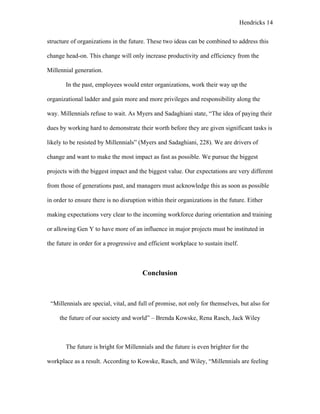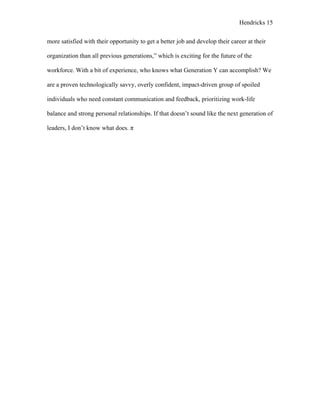Millennials in the Workplace copy
- 1. Hendricks 1 DâShai Hendricks Stephen Barley MS&E 181: Issues in Technology and Work for a Post-Industrial Economy June 3, 2014 Millennials in the Workplace: Analyzing The Future Implications of Generation Yâs Entrance into the Workforce âTo some, they are the next âGreatest Generation,â armed with the tools and inclination to drive toward a better future in a world facing economic, geopolitical, and environmental crises. To others, they are âGeneration Whine,â young people who have never been so over-indulged and protected that they are incapable of handling the most mundane task without guidance or handholdingâ â Andrea Hershatter, Molly Epstein As a Millennial myself, I always hated reading blogs, articles, research, tweets, etc. about my generation in popular media. All of the content I ever glanced at were negative perceptions and it was beginning to become commonplace, especially from older generations. I always hated how Baby Boomers and Generation Xers felt they knew my generation better than I did and had all the answers to why and how we act. In tackling this topic of millennials in the workplace, I wanted to immerse myself in the literature regarding my generation and our impact in what matters to the older generations most, the workforce. I wanted to finally glance over some material that represented my generation positively. Without this analysis, we were always going to be lazy, unenthused, inactive, and passive in my mind, but with it, I was able to really delve into the breadth of popular conceptions of Generation Y as well as the rationale behind them; some I even agree with.
- 2. Hendricks 2 Many of the negative reflections stem from differences between previous generations and us. Through my research, Iâve found discrepancies amongst scholars debating whether there are any noteworthy differences between generational groups. Personally, I believe there to be differences, and they will be referenced throughout this paper. I believe every generation has distinguishing traits, which is why we are clumped together and named in such a fashion. There are characteristics of the Baby Boomer generation, Generation X, Millennials, and there will be more to follow as well. We will explore these in this paper, but the fact of the matter is that these personas stem from phenomena that impact each generation, causing differences in worldview and expectations for all members, especially in the workforce. In this paper, I will address different aspects of Generation Y and the impact Millennials are having and will have in the workforce. First, I will look at what the current literature tells us about Gen Yâs childhood and common stereotypes of the generation in comparison to older generations. Next, I will address the common trends in attitude, skill, and outlook of Millennials in the workplace. Finally, I will try to connect these trends to future implications for how organizations may adapt for a millennial workforce. I will also address relationships between millennials and other generations in the workplace. Part I To begin, we have to define who and what Generation Y is. From my research, I will define Generation Y, also known as Gen Y and Millennials, as the cohort of individuals who were born in the early 1980s through the mid 1990s. There is much debate among intellectuals regarding the appropriate range of years of every generation,
- 3. Hendricks 3 especially Generation Y. Individuals canât seem to agree on a time frame for the Millennials, but I believe this to be the most representative of the Millennial group. Those born in the 1970s, even late 70s, are in there early forties, deep in their careers. Those classified as Millennials are individuals who are just entering the workforce, either from graduate school and college, or in early stages of their career. Furthermore, those born in the new millennium have very different experiences, viewpoints, and interactions with the world as those just entering high school and downward. In order to accurately discuss Gen Y, we have to set a cut off for where this cohort begins and ends, and early 80s to mid 90s represents this group best after reading hundreds of pages about this cohort throughout this process. Now that weâve established the cohort to be analyzed, we will look at the two most common stereotypes of Gen Y and the commonalities and differences that thread between older generations and us. The first is that Millennials are spoiled beyond belief. As the first generation to grow up on and with such an abundance of technological advances, many scholars believe this cohort to be very spoiled, sheltered, supported, and filled with unprecedented optimism. As evidenced in the quote prefacing this paper, intellectuals consider us âGeneration Whineâ because of the protection and guidance the generation has received. In Kowske, Rasch, and Wileyâs âMillennialsâ (Lack of) Attitude Problem: An Empirical Examination of Generation Effects on Work Attitudes,â they contend the generation is âsheltered, having been smothered with safety rules and devicesâ (Kowske, Rash and Wiley, 266). This suggests not only that previous generations spent time trying to protect us, with events like Columbine, 9-11, nuclear threats, etc., but also that technological gifts have been used to ease our nerves and serve as sources of protection from the
- 4. Hendricks 4 outside world. They believe Gen Y has been provided everything they ever needed. Some scholars even go so far as insinuating our âgood, protectedâ childhood speaks to our adulthood expectations as well: âThey were valued as children, and they expect their careers to meet their basic financial needs and indeed to provide comfortable life-stylesâ (Myers and Sadaghiani, 232). Some researchers take a different approach in applying the common theme of a spoiled childhood to causing Millennials to pursue an ambitious future. Balda and Mora describe my generation as âempowered and optimistic to undertake major personal projectsâ (Balda and Mora, 14) as a result of the care and attention we received in our developing years. We Millennials obviously view this time of our lives a little differently, though. We push aside the idea of being spoiled and support wholeheartedly an image of a pressured environment with expectations of high achievement and optimism. We are the children that are supposed to go off and do all of the things our parents couldnât do. We have been told that nothing can stop us, and we have taken this to heart in all we do. Andrea Hershatter and Molly Epstein express this idea very well in their âMillennials and the World of Work: An Organization and Management Perspectiveâ: âMillennials view themselves as pressured and high achieving and have grown accustomed to supportive, nurturing environments that provide them with every opportunity to succeedâ (Hershatter and Epstein, 215). My generation has taken the expectations placed on us and pursued them. Gen Yâs childhood experiences have done much more to our frame of mind in approaching tasks and problems than our parents and grandparents could ever have imagined.
- 5. Hendricks 5 As a result of our childhood experiences, Generation Y has developed a narcissistic personality and overwhelming confidence that has dominated our perception in popular media. The support we received as youth has translated into a level of optimism for the future that is unparalleled in other generations. In turn, though, levels of narcissism have increased from Generation X to Millennials (Kowske, Rasch and Wiley, 267). I disagreed with this statement prior to this research, but almost all of the literature I came across mentioned Generation Yâs commonplace narcissism in some manner. This attitude isnât necessarily valued but one that has become a communal assumption of those in my generation. As mentioned previously, a lot of this spurs from the âWe can do it all!â spirit and encouragement we received as children. We have been praised, pushed, and pressured to do great things in the world. This comes with a certain level of confidence. We believe we can do anything because we were raised with that language surrounding us. Scholars refer to us as the âLook at Meâ generation, insinuating an overly confident and self-absorbed demeanor (Myers and Sadaghiani, 225). In âGenerational Differences in Work-Related Attitudes: A Meta-analysis,â authors go so far as to consider us âhighly cynical and narcissisticâ in our social consciousness (Costanza, Badger, Fraser, Severt and Gade, 375-6). I do believe the generation to be overly confident in our abilities, but I donât agree that we seek attention in the way older generations believe us to. Throughout this paper, one will see more justification for why I believe Millennials care about the impact more than the recognition. There is much debate around whether Millennials differ from previous generations, but there is a lot of research to show that there are concrete belief, value, and personality differences between generational groups. Some of the differences arenât as
- 6. Hendricks 6 stark as others, but the intricacies of the generations add immense clarity to their actions and character. Hershatter and Epstein are two researchers that believe their research does not show âbelief system or values are very differentâ for Millennials (Hershatter and Epstein, 212). They go on to state in their research later, though, that Millennials are âmore confident in businesses, financial institutions, and government than any other age cohorts and than any other generations were at the same ageâ (Ibid, 215), which directly aligns with the overly confident, protected, and optimistic viewpoint that Generation Y seems to embody, unlike previous generations. This suggests that there are key differences between the groups. Table 1, shown below, from âMillennialsâ (Lack of) Attitude Problem: An Empirical Examination of Generational Effects of Work Attitudesâ visually shows the descriptions of each of the last five generations. Paying particular attention to the last three cohorts, the differences between the Gen Xers and Millennials are striking whereas there are some key similarities between Millennials and Boomers. This chart really embodies what a lot of research says in reference to the relationship between baby
- 7. Hendricks 7 boomers and Millennials; the same self-confidence and drive but without the controversial and radical element. It also tells somewhat of a story in how Generation Y came to be the group it is today when keeping in mind all of the analysis mentioned previously in this paper. The work done by Timothy H. Reisenwitz and Rajesh Iyer aligns with this, too: âGeneration Y has been characterized as less cynical, more optimistic, more idealistic, more inclined to value tradition, more similar to Baby Boomers than Generation Xâ (Reisenwitz and Iyer, 92). This even suggests, as I claimed previously, that my generation isnât as cynical as most perceive but more optimistic and achievement driven by the value added. Simply put, there are fundamental differences between Millennials and previous generations, but the influences of the previous generations are easily seen. In the next part of this paper, one will see how Gen Yâs characteristics translate into the workplace and the major external influences that caused this new cohortâs ideals and impact in the workforce. Part II The defining element of any and all Millennials that translates directly into our impact in the workplace is our relationship with technology. Generation Y grew up with, around, and through the technology of today. Some of the most significant technological advances, including cell phones, social networking services, and even the Internet, are members of the Millennial generation in terms of birth year (Hershatter and Epstein, 212). We have been fully immersed in this technology from toddlers to teenagers to young adults. We are far beyond comfortable with technology; we survive and thrive through it. Itâs changed our way of life and the manner in which we produce, receive, and
- 8. Hendricks 8 process information. We see the world in a completely different light and donât even realize it. Hershatter and Epstein expressed similar sentiments in stating, â[Millennialsâ] relationship with technology has changed the way they know the world, and their positive experience inside organizations and institutions during their school years has changed the way they interact with themâ (Ibid). As they suggest, Gen Y knows the world through the technological advances that have gained popularity over the past thirty years. Not only has this influenced our worldview but also directly impacted how the generation does work. Because we are much more comfortable with technology than previous generations (Reisenwitz and Iyer, 93), it is expected of us to utilize this skill set and knowledge base in the workplace. With arguably the most apparent difference between Millennials and other generations in the workplace being our distinctive relationship with technology (Hershatter and Epstein, 212), the expectations from older generations of our utilization and expertise is immensely profound. Furthermore, our expectations of the workplace and how we do work as a result have also shifted. The ease and comfort with which we use technology has brought Millennials to pursue work-life balance as one of the greatest factors in entering the workforce. Of course some argue that our spoiled childhood, lackluster optimism, and 24/7 accessibility to social networks influences the priority of work-life balance more, but I truly believe this aspiration comes from our idealistic vision of efficiency and productivity. My generation is proven to report a strong desire to achieve greater work-life balance in entering new jobs (Ibid, 219). We prioritize work-life balance over many other factors in pursing job opportunities because we feel we can do the impossible and be as productive as we need to during ânormal working hoursâ in order to enjoy ourselves outside of them.
- 9. Hendricks 9 Technological advancements make this much easier to manage nowadays as well, and being that our generation grew up using technology, we see its added benefit and immediate advantage in ensuring greater work-life balance. As Balda and Mora hint in their work, we prefer flexible jobs in order to spend more time developing the close personal relationships we value so much as a generation (Balda and Mora, 15). These personal relationships donât only apply outside the workplace, though. Millennials are also known for their nagging nature and needy presence in asking for constant feedback and information regarding their performance. This, once again, stems from the confidence and support we received during our developing childhood years. We have greater expectations that previous generations did not have simply because they werenât as spoiled as us. They didnât feel invincible through their desires being satisfied by the dynamic duo of technology and supportive elders, but we did, and this translated directly into our expectations of our relationships with elders in the workplace as well. Our âexpectation of a flat hierarchy and access to senior leadershipâ (Hershatter and Epstein, 220) in organizations seems unrealistic to most other generations, but when one is constantly motivated, supported, trusted, and pushed as we were growing up, he expects the same in future stages of life as well. We are not scared of elders, we embrace them. As Myers and Sadaghiani state in their âMillennials in the Workplace: A Communication Perspective on Millennialsâ Organizational Relationship and Performance,â our expectations may be linked to our ânot being intimidated by individuals who are more senior, either in age or in statusâ (Myers and Sadaghiani, 229). We seek to develop close relationships with those in older generations as well as our own, including managers and senior leadership in the workplace.
- 10. Hendricks 10 Not only do we have expectations of fostering the relationship, but we also expect constant feedback and open communication as well. As was the case in our childhood, we want âassurance that [we] are continuing to move along a linear, progressive pathâ (Hershatter and Epstein, 218). Feedback and communication do just that. In the workplace, Millennials get the constant information, feedback, communication, and satisfaction that we are used to through technology. Gen Y is not the generation that willingly accepts ambiguity, especially not when we have the ability to receive critical feedback and information. This yearn for discussion with the higher-ups of an organization in a relatively informal fashion is a stark difference from other generations, though: âNot only do Millennials expect constant communication with supervisors (yet autonomy in carrying out their responsibilities), they want communication to be more of a dialogue; and for it to be more open, positive, respectful, and affirming than previous generations expectedâ (Balda and Mora, 20). We donât care if the information is sensitive, private, or reserved; open communication is expected from managers (Myers and Sadaghiani, 229). We are a very ambitious and driven generation, and open communication and access helps us do what we need to do faster and better. Constant communication and feedback from managers just makes the Millennialsâ ultimate goal of driving change and adding value within the organization happen even faster and more efficiently. Alongside all of the negative views of Generation Y are perceptions of being âchange agents on a grand scaleâ (Hershatter and Epstein, 221) and being âimpatient about being recognized as valuable contributorsâ (Myers and Sadaghiani, 230) within the workplace. When Millennials enter the workforce, we expect and yearn to âcontribute to the organization immediatelyâ (Reisenwitz and Iyer, 101). We
- 11. Hendricks 11 pursue exactly what was expected of us growing up. We want to take the leadership positions and be on the big projects that arenât usually offered to the interns and analysts. Myers and Sadaghiani reference this idea in their research: âMillennials may surprise their boomer and Gen X managers when they seek key roles in significant projects soon after their organizational entry and very early in the membership negotiation processâ (Myers and Sadaghiani, 228). Millennials seek to make an impact, add value, and drive change in the workplace, and as more and more Millennials enter the workforce, these attitudes will begin to influence organizations. In the last part of this paper, I analyze some implications Millennials may have on the future of the workplace as we know it. Part III Each of the aspects of Millennials referenced in Part II that translate into the workplace has direct implications for the future. Technology, as the source of many of the others, probably has the most potential for influence, as we are already seeing drastic changes made within organizations to stay up to date with technological advancements. Nowadays, though, companies must adapt for both the technology and the generation of workers that are most comfortable with it. According to Reisenwitz and Iyerâs âDifferences in Generation X and Generation Y: Implications for the Organization and Marketers,â members of Generation Y have greater overall satisfaction with the Internet than members of Generation X (Reisenwitz and Iyer, 93). Even though this information probably isnât very surprising to most, itâs representative of the difference between the current workforce and the incoming one. Reisenwitz and Iyer also point out that organizations may be confident in assigning more internet-based tasks to Generation Y
- 12. Hendricks 12 recruits as a result (Ibid, 100). Research from J.B. Balda and F. Mora in their âAdapting Leadership Theory and Practice for the Networked, Millennial Generationâ shows that not only are Millennials more comfortable with the Internet but also that they are simply more efficient with it: ââĶbetter at multitasking, responding to visual stimulation, filtering out distractions and accessing relevant information on the Web at a lightning paceâ (Balda and Mora, 15). This will lead organizations to be more productive through increased utilization of technology and the Internet with new Millennial workers at their disposal. Many organizations have already begun to see the influence of social networking sites and have hired Millennials to âpopulate and utilize internal social networksâ (Hershatter and Epstein, 214) to keep up with the times. In addition, Hershatter and Epstein research found that our generation was âleast likely of any population under sixty to use email on a daily basis, and by far the most likely of any age cohort to embrace texting as a regular mode of communicationâ (Ibid). This may change how companies utilize email versus text messaging as forms of communication in the future. The subsequent comfort with technology the workplace will obtain through a Millennial workforce will also impact the justification of a new understanding of work- life balance. It is clear to those who have experienced or know people who have experienced working from home or working out of the office that there are immediate positive results in terms of work-life balance. The ability to do work at oneâs own pace in the comfort of whatever setting one wishes is a beautiful feeling that allows individuals to have more ownership and control over their work and production: âTechnology facilitates the work-life balance Millennials desire because it frees employees to work at a time and
- 13. Hendricks 13 place convenient to themâ (Hershatter and Epstein, 219). The technological advancements over the years have really attracted employees and families, and with Millennials entering the workforce, an employerâs hesitation utilizing this technology because of lack of productivity and efficiency when not in the office is eased a bit. This new priority of work-life balance that Millennials pursue so strongly may eventually lead to older generations acknowledging the importance of it as well: âMillennialsâ push for work-life balance may attract the attention of management who may already be feeling pressure to alter official discourses that normalize âworkaholicâ behaviors and villainize workers who take advantage of family leave policiesâ (Myers and Sadaghiani, 228). Eventually, Millennialsâ prioritization of work-life balance will cause organizations nationwide to make it a priority as well in order to continue to attract Millennial talent. Another area of the workplace that may be influenced by Millennial perspective is the idea of entry level and senior management relationships. As mentioned in Part II, Gen Yers are very comfortable and forthright in speaking with direct mangers and upper level management. In general, we donât necessarily believe in hierarchical structures overpowering meaningful relationships. As Balda and Mora suggest, âMillennials strongly value meaningful relationships with peers and supervisors, suggesting that open communications might be a way of promoting job stability for Millennial workersâ (Balda and Mora, 15). In other words, in order for an organization to sustain Millennial workers, they have to be willing to allow open feedback and communication between low-level employees and managers. Mentorship will be key in ensuring this is possible. Andrea Hershatter and Molly Epstein offer the approach of âbuild[ing] occasional opportunities for hierarchy-skipping interactionsâ (Hershatter and Epstein, 220) into the
- 14. Hendricks 14 structure of organizations in the future. These two ideas can be combined to address this change head-on. This change will only increase productivity and efficiency from the Millennial generation. In the past, employees would enter organizations, work their way up the organizational ladder and gain more and more privileges and responsibility along the way. Millennials refuse to wait. As Myers and Sadaghiani state, âThe idea of paying their dues by working hard to demonstrate their worth before they are given significant tasks is likely to be resisted by Millennialsâ (Myers and Sadaghiani, 228). We are drivers of change and want to make the most impact as fast as possible. We pursue the biggest projects with the biggest impact and the biggest value. Our expectations are very different from those of generations past, and managers must acknowledge this as soon as possible in order to ensure there is no disruption within their organizations in the future. Either making expectations very clear to the incoming workforce during orientation and training or allowing Gen Y to have more of an influence in major projects must be instituted in the future in order for a progressive and efficient workplace to sustain itself. Conclusion âMillennials are special, vital, and full of promise, not only for themselves, but also for the future of our society and worldâ â Brenda Kowske, Rena Rasch, Jack Wiley The future is bright for Millennials and the future is even brighter for the workplace as a result. According to Kowske, Rasch, and Wiley, âMillennials are feeling
- 15. Hendricks 15 more satisfied with their opportunity to get a better job and develop their career at their organization than all previous generations,â which is exciting for the future of the workforce. With a bit of experience, who knows what Generation Y can accomplish? We are a proven technologically savvy, overly confident, impact-driven group of spoiled individuals who need constant communication and feedback, prioritizing work-life balance and strong personal relationships. If that doesnât sound like the next generation of leaders, I donât know what does. Ï
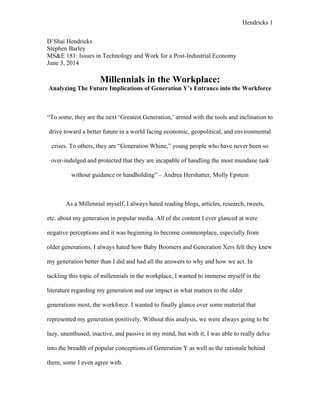
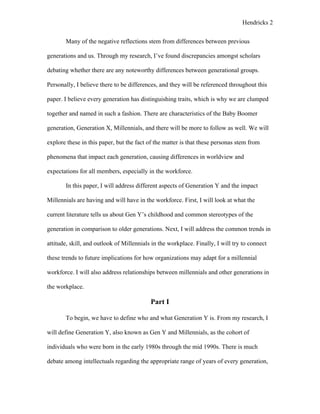
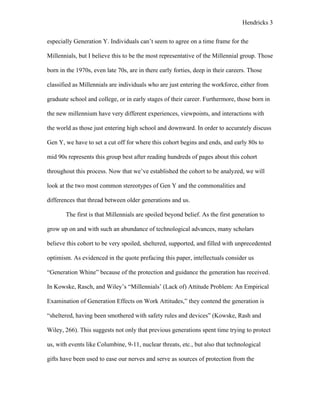
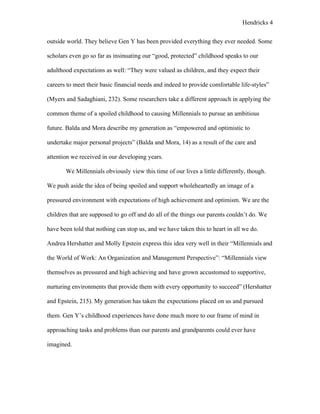
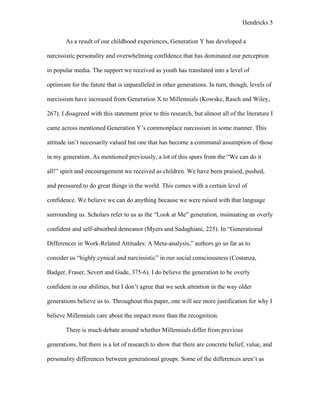
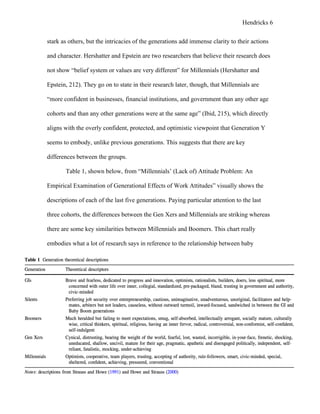
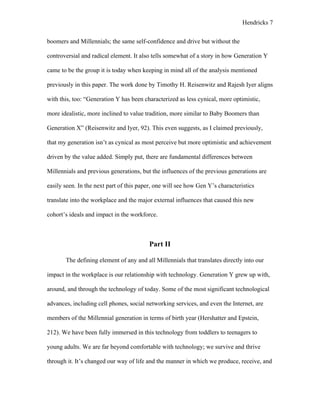
![Hendricks 8
process information. We see the world in a completely different light and donât even
realize it. Hershatter and Epstein expressed similar sentiments in stating, â[Millennialsâ]
relationship with technology has changed the way they know the world, and their positive
experience inside organizations and institutions during their school years has changed the
way they interact with themâ (Ibid). As they suggest, Gen Y knows the world through the
technological advances that have gained popularity over the past thirty years. Not only
has this influenced our worldview but also directly impacted how the generation does
work. Because we are much more comfortable with technology than previous generations
(Reisenwitz and Iyer, 93), it is expected of us to utilize this skill set and knowledge base
in the workplace. With arguably the most apparent difference between Millennials and
other generations in the workplace being our distinctive relationship with technology
(Hershatter and Epstein, 212), the expectations from older generations of our utilization
and expertise is immensely profound. Furthermore, our expectations of the workplace
and how we do work as a result have also shifted.
The ease and comfort with which we use technology has brought Millennials to
pursue work-life balance as one of the greatest factors in entering the workforce. Of
course some argue that our spoiled childhood, lackluster optimism, and 24/7 accessibility
to social networks influences the priority of work-life balance more, but I truly believe
this aspiration comes from our idealistic vision of efficiency and productivity. My
generation is proven to report a strong desire to achieve greater work-life balance in
entering new jobs (Ibid, 219). We prioritize work-life balance over many other factors in
pursing job opportunities because we feel we can do the impossible and be as productive
as we need to during ânormal working hoursâ in order to enjoy ourselves outside of them.](https://image.slidesharecdn.com/96c21d86-16cb-4e98-943a-d3bf7e56cec2-160707144650/85/Millennials-in-the-Workplace-copy-8-320.jpg)
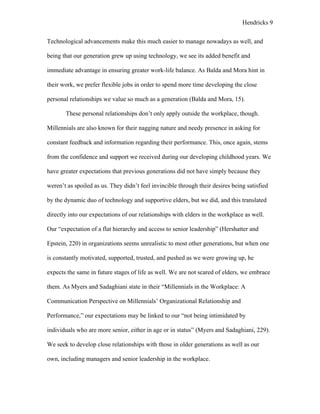
![Hendricks 10
Not only do we have expectations of fostering the relationship, but we also expect
constant feedback and open communication as well. As was the case in our childhood, we
want âassurance that [we] are continuing to move along a linear, progressive pathâ
(Hershatter and Epstein, 218). Feedback and communication do just that. In the
workplace, Millennials get the constant information, feedback, communication, and
satisfaction that we are used to through technology. Gen Y is not the generation that
willingly accepts ambiguity, especially not when we have the ability to receive critical
feedback and information. This yearn for discussion with the higher-ups of an
organization in a relatively informal fashion is a stark difference from other generations,
though: âNot only do Millennials expect constant communication with supervisors (yet
autonomy in carrying out their responsibilities), they want communication to be more of
a dialogue; and for it to be more open, positive, respectful, and affirming than previous
generations expectedâ (Balda and Mora, 20). We donât care if the information is
sensitive, private, or reserved; open communication is expected from managers (Myers
and Sadaghiani, 229). We are a very ambitious and driven generation, and open
communication and access helps us do what we need to do faster and better.
Constant communication and feedback from managers just makes the Millennialsâ
ultimate goal of driving change and adding value within the organization happen even
faster and more efficiently. Alongside all of the negative views of Generation Y are
perceptions of being âchange agents on a grand scaleâ (Hershatter and Epstein, 221) and
being âimpatient about being recognized as valuable contributorsâ (Myers and
Sadaghiani, 230) within the workplace. When Millennials enter the workforce, we expect
and yearn to âcontribute to the organization immediatelyâ (Reisenwitz and Iyer, 101). We](https://image.slidesharecdn.com/96c21d86-16cb-4e98-943a-d3bf7e56cec2-160707144650/85/Millennials-in-the-Workplace-copy-10-320.jpg)
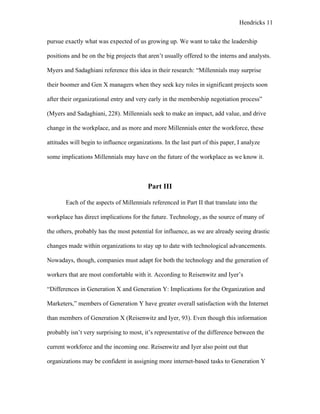
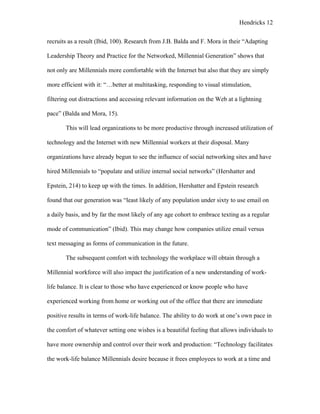
![Hendricks 13
place convenient to themâ (Hershatter and Epstein, 219). The technological
advancements over the years have really attracted employees and families, and with
Millennials entering the workforce, an employerâs hesitation utilizing this technology
because of lack of productivity and efficiency when not in the office is eased a bit. This
new priority of work-life balance that Millennials pursue so strongly may eventually lead
to older generations acknowledging the importance of it as well: âMillennialsâ push for
work-life balance may attract the attention of management who may already be feeling
pressure to alter official discourses that normalize âworkaholicâ behaviors and villainize
workers who take advantage of family leave policiesâ (Myers and Sadaghiani, 228).
Eventually, Millennialsâ prioritization of work-life balance will cause organizations
nationwide to make it a priority as well in order to continue to attract Millennial talent.
Another area of the workplace that may be influenced by Millennial perspective is
the idea of entry level and senior management relationships. As mentioned in Part II, Gen
Yers are very comfortable and forthright in speaking with direct mangers and upper level
management. In general, we donât necessarily believe in hierarchical structures
overpowering meaningful relationships. As Balda and Mora suggest, âMillennials
strongly value meaningful relationships with peers and supervisors, suggesting that open
communications might be a way of promoting job stability for Millennial workersâ
(Balda and Mora, 15). In other words, in order for an organization to sustain Millennial
workers, they have to be willing to allow open feedback and communication between
low-level employees and managers. Mentorship will be key in ensuring this is possible.
Andrea Hershatter and Molly Epstein offer the approach of âbuild[ing] occasional
opportunities for hierarchy-skipping interactionsâ (Hershatter and Epstein, 220) into the](https://image.slidesharecdn.com/96c21d86-16cb-4e98-943a-d3bf7e56cec2-160707144650/85/Millennials-in-the-Workplace-copy-13-320.jpg)
